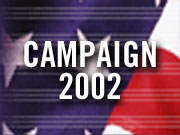Profile: Secretary of State race
October 21, 2002
Minnesota's only statewide Republican office-holder is running for re-election this year. Secretary of State Mary Kiffmeyer is facing challengers on three fronts, including DFLer Buck Humphrey, Independence Party candidate Dean Alger, and Green Party nominee Andrew Koebrick. The race isn't generating as much attention as the governor's contest or the tight U.S. Senate race, but the four secretary of state candidates say the match-up is crucial to the future administration of the state's elections.
Minnesota consistently ranks among the top states for its voter participations rates, and has received straight A's from the watchdog group Common Cause for its elections administration. That, says current Secretary of State Mary Kiffmeyer, should be a point of pride. And one she's more than happy to take some credit for.
"I think that the work that we've done over the last four years in every area of the office -- from elections to business services to the voter outreach to brochures -- and the results we've gotten because of that, I think, is an excellent record," she says.
Kiffmeyer says she's worked hard to update the state's election system, particulary in light of irregularities in Florida's 2000 presidential balloting. And she says she's made efforts to encourage the participation of younger voters.
But her opponents say her record is not without controversy. All three accuse her of barely-concealed partisanship, which they say is unacceptable for the state's chief elections officer.
DFLer Buck Humphrey notes that in 2000, Kiffmeyer declined to publicize the Democrats' spring caucuses as she did for the other major political parties, a move Humphrey says was meant to confuse DFLers.
Humphrey, the grandson of former vice-president Hubert Humphrey, says Kiffmeyer's conduct runs contrary to her primary responsibilities.
"I want to promote everybody's involvement. And it's not on my terms; it's on their terms. And the secretary of state as the chief democratic advocate -- small 'd' -- should be that person who gets out there; whether it's in the media, whether it's in person, whether it's online, and is really advocating for our democracy," Humphrey says.
Kiffmeyer has said state statute requires caucuses to be held on Tuesday nights, and she didn't highlight DFL caucuses because the party unilaterally decided to hold its meetings on the weekend instead.
IP nominee Dean Alger is also critical of Kiffmeyer's record. He accuses her of having let Republican Supreme Court candidate Greg Wersal use his wife's Scandinavian maiden name on the 2000 ballot in violation of state law.
Kiffmeyer says women commonly take their husbands' names and that disallowing Wersal's name-change would amount to gender discrimination. Alger, who has studied and taught university courses on election matters, says despite his IP nomination, he plans to remain above granting partisan favors.
"Everywhere I talked, to Independence Party congressional district meetings and so on all the way up through the state convention, I said the secretary of state -- chief election officer -- must not be an intense partisan. I'm proud of my nonpartisan record. And you know something? They cheered," he said.
Green Party candidate Andrew Koebrick currently works for the state planning department. He says the Minnesota's election system should be modified to allow voters to rank all candidates on the ballot rather than simply select one of them.
This method -- known as "instant run-off voting" -- would allow voters' second, third, or lower choices to count if their first choices failed to gain much support. Koebrick says Minnesota is known for pioneering election reforms.
"We know that instant run-off voting increases turnout. We now that instant-running voting can save us money by consolidating some of the primary and final elections if we choose to go that route. We know that instant run-off voting gets rid of vote splitting. If you look at the last presidential election, that was huge," he says.
IP nominee Alger says he also supports instant run-off balloting. Kiffmeyer and Humphrey say they're willing to discuss the idea, but they say it's advantages may be overstated.
|
News Headlines
|
Related Subjects
|

